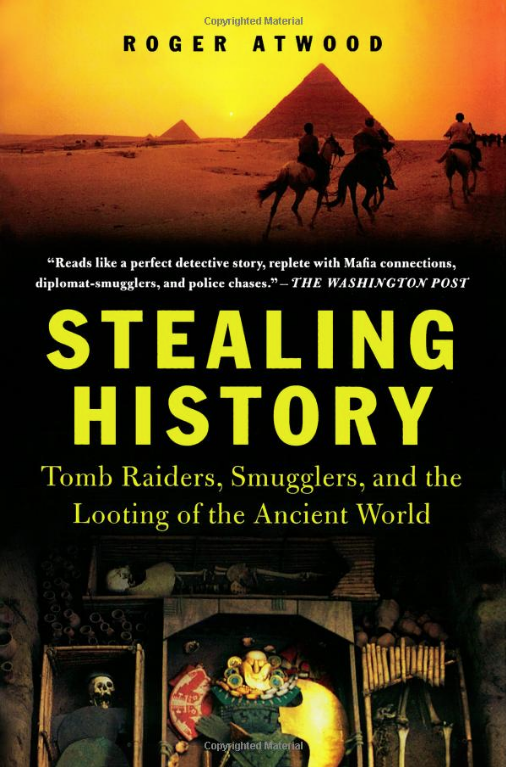“Riveting … takes readers on a thorough investigation. ” — The Chicago Sun-Times
From the publisher: In this fascinating book, Atwood takes readers on a journey through Iraq, Peru, Hong Kong and across America, showing how the worldwide antiquities trade is destroying what’s left of ancient sites before archaeologists can reach them. Part detective story and part meditation on the power of art and culture, Stealing History is an essential account of how the past is being dug out from under us.
“Compelling, thorough, first-hand.” — American Journal of Archaeology
“A perfect detective story … exposes quite a few skeletons in the cupboards of respected American institutions.” — The Washington Post
“Atwood gained extraordinary access to actors at every level of the illicit trade in antiquities … packed with detail.” — The Boston Globe
“A disturbing tale of greed and cultural demolition, robust in the telling, scorching in its indictment.” — Kirkus Reviews
Reviews
This vividly written, well-researched book is a great primer for anyone interested in the ongoing struggle by archaeologists, law enforcement officials, and national governments to curb the illegal antiquities trade.
Julia Klein in ArchaeologyStealing History is an immensely compelling and disturbing tale of greed, destruction, and woe … the first book I’ve read that really does the subject justice. It’s a must-read.
Heather Pringle, author of The Mummy CongressAtwood gained extraordinary access to actors at every level of the illicit trade in antiquities . . . Packed with detail.
The Boston GlobeThis book contributes more than any other publication in more than 30 years to an understanding of the devastation to cultural heritage caused by site looting and to the search for solutions. … This is the first book to address the topic since the publication of Karl Meyer’s book The Plundered Past (New York 1973). Atwood’s book is, therefore, a most welcome addition to the literature. Atwood, however, takes the subject much further than Meyer did and, as such, does a significant service by adding to our understanding of the operation of the international market in archaeological artifacts and its disastrous consequences for the preservation of archaeological sites. … The first author to interview and trace the process looting from the very ground. … Stealing History is also an ethnographic study. It explains the transformation of long-term, low-level “subsistence” looting, which was given an almost ritualistic and religious context in Peru, into commercial looting. … Offers considerable insight into the causes of looting, the formation of smuggling networks, and the direct incentive provided by the market. … Makes a significant
Patty Gerstenblith in American Journal of ArchaeologyRiveting … takes readers on a thorough investigation from war-ravaged Iraq to northern Peru
The Chicago Sun-TimesStealing History, now deservedly re-released in paperback, is a disturbing book with a disturbing prediction: “The day is not far off when an archeologist can go through an entire career without seeing a single unpillaged site.” … Atwood follows the supply chain upwards.
The AustralianExposes quite a few skeletons in the cupboards of respected American institutions . . . Yet Atwood not only describes the disease, he tries to find a cure. He proposes a detailed program of international and domestic legislation to stop gravediggers, smugglers, and their rich patrons.
Konstantin Akinsha in The Washington PostEloquent … compelling … a very exciting read. … Atwood does a masterful job weaving all of these fascinating stories together, demonstrating how objects move from source to market nations, and relating how law enforcement in America is attempting to expose and eliminate the smuggling of illegal objects into the USA
Culture Without Context (UK)A well-written book about an important issue in the world of art and history
St. Louis Post-DispatchCompelling … The characters of this drama are vividly drawn … Atwood’s detailed accounts of law enforcement’s failing at most levels are disturbing … [a] valuable book.
David D'Arcy in The Art NewspaperProdigiously researched . . . eloquent . . . Atwood’s aim is not merely to entertain, and he uses the case of the Sipán and the Peruvian antiquities trade to explore the global problem of looting and the forces that sustain it.
Hugh Eakin in ARTnewsAn eye-opening and engrossing look into the dark world of looting and smuggling … a fascinating read.
Academia

